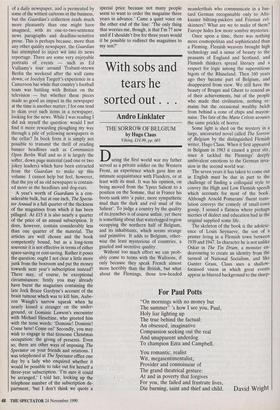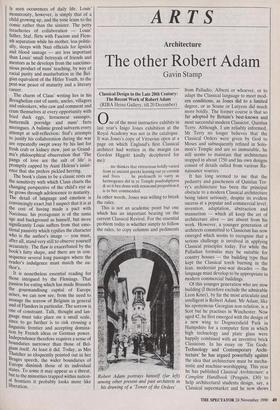With sobs and tears he sorted out. .
Andro Linklater
THE SORROW OF BELGIUM by Hugo Claus Viking, £14.99, pp. 603 During the first world war my father served as a private soldier on the Western Front, an experience which gave him an intimate acquaintance with Flanders, or at least with its mud. It was his opinion, on being moved from the Ypres Salient to a position on the Somme, that in France his boots sank into 'a paler, more sympathetic mud than the dark and evil mud of the Salient'. To judge a country by the quality of its.trenches is of course unfair, yet there is something about that waterlogged region occupying the northern half of Belgium, and its inhabitants, which seems strange and primitive. It adds to Belgium, other- wise the least mysterious of countries, a gnarled and secretive quality.
Without too much effort we can prob- ably come to terms with the Walloons, if only because they speak French almost more horribly than the British, but what about the Flemings, those tow-headed neanderthals who communicate in a bas- tard German recognisable only to Afri- kaaner biltong-packers and Friesian eel- skinners? What are we to make of them? Europe hides few more sombre mysteries.
Once upon a time, there was nothing more cosmopolitan and sophisticated than a Fleming. Flemish weavers brought high technology and a sense of beauty to the peasants of England and Scotland, and Flemish thinkers spread literacy and a respect for logic among the superstitious bigots of the Rhineland. Then 160 years ago they became part of Belgium, and disappeared from view. We still have the beauty of Bruges and Ghent to remind us of their achievements, but of the people who made that civilisation, nothing re- mains but the occasional wealthy belch from behind a cone of chips and mayon- naise. The fate of the Marie Celeste arouses the same prickle of horror.
Some light is shed on the mystery in a large, uncorseted novel called The Sorrow of Belgium by the distinguished Flemish writer, Hugo Claus. When it first appeared in Belgium in 1983 it caused a great stir, since it tackled the Flemings' deeply ambivalent emotions to the German inva- sion in the second world war.
The seven years it has taken to come out in English must be due in part to the challenge of finding a colloquial style to convey the High and Low Flemish speech which accounts for most of the book. Although Arnold Pomerans' fluent trans- lation conveys the comedy of small-town gossip, I sensed a flatness where perhaps niceties of dialect and education had in the original supplied some life.
The skeleton of the book is the adolesc- ence of Louis Seynaeve, the son of a printer living in a Flemish town between 1939 and 1947. In character he is not unlike Oskar in The Tin Drum, a monster en- deavouring to create an identity from the turmoil of National Socialism, and like Gunter Grass, Claus uses a shallow - focussed vision in which great events appear as blurred background to the sharp ly seen occurences of daily life. Louis' monstrosity, however, is simply that of a child growing up, and the tone leans to the comic rather than the sinister. The petty treacheries of collaboration — Louis' father, Staf, flirts with Fascism and Flem- ish separatism while his mother, less politic- ally, sleeps with Nazi officials for lipstick and blood sausage — are less important than Louis' small betrayals of friends and mentors as he develops from the sanctimo- nious product of nuns' teaching, by way of racial purity and masturbation in the Bel- gian equivalent of the Hitler Youth, to the post-war peace of maturity and a literary career.
The charm of Claus' writing lies in his Breughelian cast of aunts, uncles, villagers and onlookers, who caw and comment and cram themselves at every opportunity with fried duck eggs, horsemeat sausages, buttermilk porridge and nuns' farts meringues. A bulimic greed subverts every attempt at self-reflection: Stars attempts to justify his collaboration during the war are repeatedly swept away by his lust for fresh crab or kidney stew, just as Grand- ma's philosophical observation that 'The Pangs of love are the salt of life' is Promptly capped by Aunt Helene's insist- ence that she prefers pickled herring. The book's claim to be a classic rests on the sensitivity with which Claus charts the changing perspective of the child's eye as he grows through adolescence to matunty. The detail of language and emotion is convincingly exact,but I suspect that it is at the cost of having made a pact with Narcissus: his protagonist is of the same age and background as himself, but more Significantly Louis suffers from that emo- tional passivity which typifies the character who is the author's image — you must, after all, stand very still to observe yourself accurately. The flaw is exacerbated by the book's fatty shape, and there are in con- sequence several long passages where the reader's indulgence must match the au- thor's.
It is nonetheless essential reading for those intrigued by the Flemings. That Passion for eating which has made Brussels the gourmandising capital of Europe arises, we can now see, from the need to assuage the sorrow of Belgium in general and of Flanders in particular. The sorrow is one of constraint. Talk, thought and lan- guage must take place on a small scale. smce to go further is to risk crossing a linguistic frontier and accepting domina- tion by French ideas or German power. Independence therefore requires a sense of boundaries narrower than those of Bel- gium itself. At least it did. Today, as Mrs Thatcher so eloquently pointed out in her Bruges speech, the wider boundaries of Europe diminish those of its individual states. To some it may appear as a threat, but to the minorities trapped within nation- al frontiers it probably looks more like liberation.



































































 Previous page
Previous page